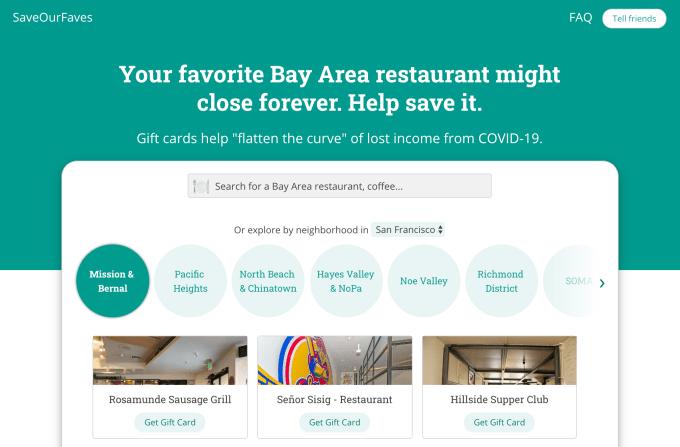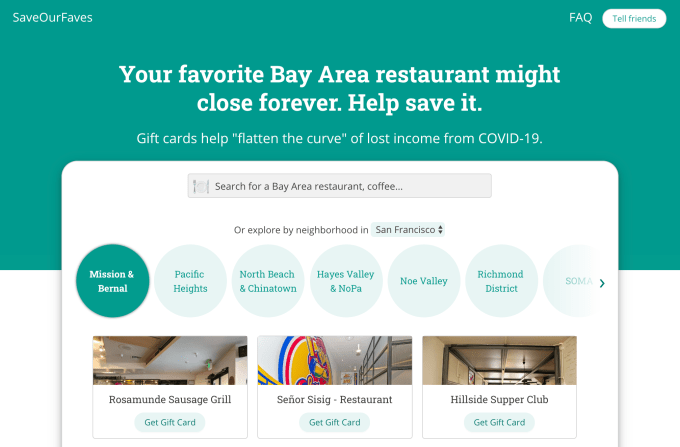Coronavirus quarantines are hurting local businesses, but Instagram co-founder Mike Krieger wants to help them keep revenue rolling in. Krieger and his wife Kaitlyn this week launched SaveOurFaves, a directory of Bay Area restaurants selling gift certificates to offset lost income amidst ‘shelter in place’ orders across the region. Users can search for restaurants or browse by neighborhood, and then click through to buy gift certificates straight from the eateries with no added fee from SaveOurFaves.
“We’re no longer going out because of COVID-19 (San Francisco is under a “shelter in place” ordinance), so we started buying gift cards to help support our favorite cafes and restaurants during this unpredictable time” write the Kriegers. “SaveOurFaves is our simple way to make it easier for people to help local businesses.”

For now the plan is for SaveOurFaves to focus on the San Francisco Bay Area that the Kriegers call home. It’s currently listing 700 restaurants and coffee shops, and getting 50 submissions per day. Similar sites for other locations are quickly popping up, including Help Main Street in New York, and Give Local and Rally For Restaurants that provide directories for multiple cities.
“It’s been heart-wrenching”
The Kriegers got the idea for SaveOurFaves after a call with Zack Schwab, Mike’s sister’s partner and co-owner of SF restaurant The Snug. “How long could he keep the restaurant afloat with sales plunging?” Kaitlyn tells me. The couple says there are 12,000 small businesses that employ more than 350,000 people in SF alone. The problem was too big to fix with one-off donations.
But then they saw an Instagram post about how NYC restaurant Atomix was asking their community to support them through gift cards, and set out to build SaveOurFaves with Kaitlyn doing design while Mike coded. They crawled the web for a list of local restaurants, and hired people through Fiverr to hunt down their gift card links. Next they want to open source the code and expand the site to include other types of businesses.
“I’ve lived in the Bay Area for over 15 years, and one of the reasons I fell in love with it was the vibrant community of shops, restaurants, cafés, and other businesses” Mike tells me. “It’s been heart-wrenching to see the immediate effect that the shutdown has had on the people working at these places. While there’s no one single thing that will solve the problem, I’m hopeful SaveOurFaves is one of many initiatives to help.”

AUSTIN, TX – MARCH 11: Josh Constine, Mike Krieger and Kevin Systrom speak onstage at Interactive Keynote: Instagram Founders Kevin Systrom & Mike Krieger with Josh Constine during the 2019 SXSW Conference and Festivals at Austin Convention Center on March 11, 2019 in Austin, Texas. (Photo by Chris Saucedo/Getty Images for SXSW)
Krieger and his co-founder Kevin Systrom resigned from Instagram and Facebook in November 2018 following tensions regarding Insta’s dwindling autonomy. The pair told me they plan to start something new together during a talk at SXSW a year ago, but are still exploring opportunities. That’s given Krieger the time to build out SaveOurFaves with his wife.
Restaurants need all the help they can get. “This is like armageddon” SF restaurant China Live’s chef and owner Geroge Chen told Eater’s Luke Tsai, referring to the three-week shelter-in-place order issued in across California.
While restaurants can still offer delivery and take-out, higher-end spots with large dining rooms or that usually only offer dine-in are being hit hard. China Live cut its workforce from 200 to 20. Oakland’s Brown Sugar Kitchen laid of its whole staff of 50 except for three full-timers. The SF Mission’s Prubechu went from 20 to employees to just 5 managers who also took pay cuts, according to Eater.

Brown Sugar Kitch and Prubechu are now two of the many restaurants listed on SaveOurFaves. If users discover one of their favorite haunts is missing, they can submit them via a form to have them added or to have SaveOurFaves reach out to recommend selling gift certificates. The site even recommends how restaurants can contact their point-of-sale provider like Square or Toast to start selling gift certificates, or make their own gift cards on GiftUp or GiftFly.
More ways to help
SaveOurFaves is just one of many efforts spearheaded by local techies to address the health crisis and the subsequent financial fallout of social distancing. Crypto startup MobileCoin‘s Joshua Goldbard helped create The Safety Net Fund, which has raised $145,000 to provide living expense grants to Bay Area artists who’ve lost income due to event cancellations. Investor Ryan Sarver of Redpoint Ventures and friends are running an #SFHospitalMeals program where people can donate $1000 to buy meals from local restaurants for hospital staff of SF’s emergency rooms and intensive care units. You can click through those links to donate.
The Kriegers hope the government will do more too. That includes “Big, immediate, and lasting cash transfers to Americans” as well as zero-interest loans for small businesses that need representation in the conversations about stimulus efforts. “We are also advocating for a reduction in prison & jail density, because those populations are exceptionally vulnerable to a pandemic like this” Kaitlyn tells me.
In the private sector, they support the idea from Electronic Frontier Foundation’s Peter Eckersley for Apple, Google, and other mobile operating system vendors to create an opt-in, privacy-preserving feature for contact tracing. That could notify people if they’ve been near someone who tested positive for the virus. And when the crisis subsides, the couple note that we’ll need ways to smoothly reconnect people with stable jobs.
“There’s been a lot of talk about ‘flattening the curve’ of the coronavirus outbreak — slowing the spread to reduce the burden on our healthcare system” Mike concludes. “We hope SaveOurFaves will help ‘flatten the curve’ of lost income for restaurants — giving them the resources to make ends meet and preserve the livelihood of wage earners during this difficult time.”







